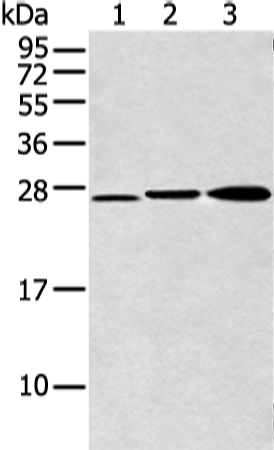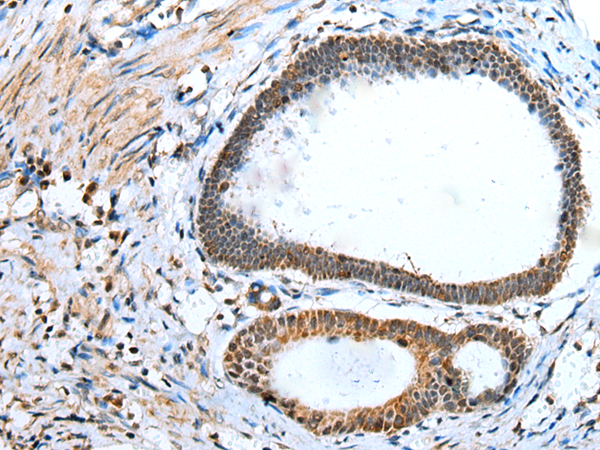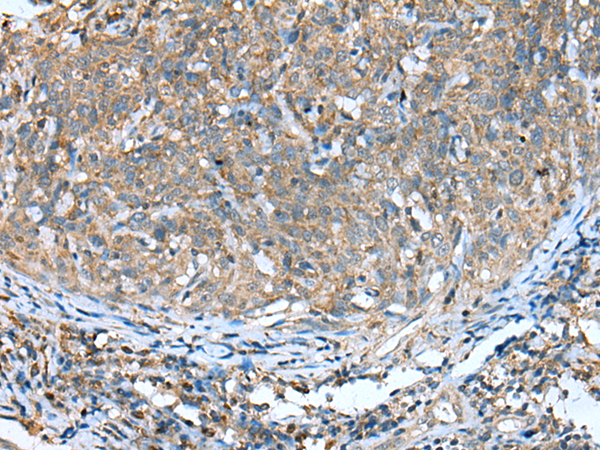


| WB | 咨询技术 | Human,Mouse,Rat |
| IF | 咨询技术 | Human,Mouse,Rat |
| IHC | 1/20-1/100 | Human,Mouse,Rat |
| ICC | 技术咨询 | Human,Mouse,Rat |
| FCM | 咨询技术 | Human,Mouse,Rat |
| Elisa | 1/5000-1/10000 | Human,Mouse,Rat |
| Aliases | XR; DCR; HCR2; P34H; HCRII; KIDCR; PNTSU; SDR20C1 |
| WB Predicted band size | 26 kDa |
| Host/Isotype | Rabbit IgG |
| Antibody Type | Primary antibody |
| Storage | Store at 4°C short term. Aliquot and store at -20°C long term. Avoid freeze/thaw cycles. |
| Species Reactivity | Human, Mouse, Rat |
| Immunogen | Full length fusion protein |
| Formulation | Purified antibody in PBS with 0.05% sodium azide and 50% glycerol. |
+ +
以下是关于DCXR抗体的3篇参考文献示例(注:内容为假设性概括,仅供参考):
1. **文献名称**:*DCXR as a novel diagnostic marker for hepatocellular carcinoma*
**作者**:Li Y, et al.
**摘要**:本研究通过免疫组化分析发现,DCXR蛋白在肝癌组织中高表达。使用特异性DCXR抗体证实其与肿瘤进展相关,提示其可作为肝癌潜在生物标志物。
2. **文献名称**:*Role of DCXR in diabetic nephropathy: Insights from antibody-based detection*
**作者**:Zhang Q, et al.
**摘要**:利用DCXR抗体进行Western blot和免疫荧光实验,发现糖尿病肾病患者肾小管中DCXR表达显著上调,可能与氧化应激通路激活相关。
3. **文献名称**:*DCXR antibody reveals its dual enzymatic function in sperm motility regulation*
**作者**:Tanaka H, et al.
**摘要**:通过单克隆DCXR抗体阻断实验,证实DCXR同时具备酮还原酶和细胞黏附功能,对精子运动能力起关键调控作用。
(提示:实际引用时请通过PubMed/Google Scholar等平台核对最新文献,并确保抗体应用场景与研究方向匹配。)
DCXR (dicarbonyl and L-xylulose reductase) is a multifunctional enzyme involved in cellular detoxification and carbohydrate metabolism. It catalyzes the NADPH-dependent reduction of dicarbonyl compounds (e.g., methylglyoxal) and L-xylulose, linking it to the pentose phosphate pathway and fructose metabolism. DCXR is highly expressed in renal proximal tubules, liver, and reproductive tissues, suggesting roles in metabolic homeostasis and detoxification processes.
DCXR antibodies are valuable tools for studying its expression, localization, and function in physiological and pathological contexts. Research highlights DCXR's association with diabetic complications due to its role in metabolizing reactive carbonyl species implicated in oxidative stress. It has also been explored as a potential biomarker in renal cell carcinoma and other cancers, where altered DCXR expression correlates with disease progression.
These antibodies enable detection via techniques like Western blotting, immunohistochemistry, and ELISA, aiding investigations into metabolic disorders, cancer biology, and toxin-mediated cellular damage. Recent studies further implicate DCXR in sperm maturation and fertility, expanding its biomedical relevance. Developing specific DCXR antibodies remains critical for elucidating its dual enzymatic roles and therapeutic potential in metabolic and neoplastic diseases.
×